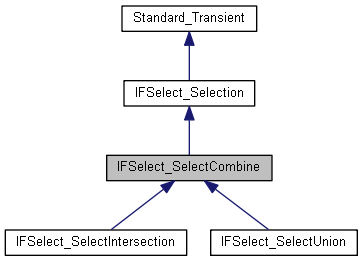A SelectCombine type Selection defines algebraic operations between results of several Selections It is a deferred class : sub-classes will have to define precise what operator is to be applied.
More...
|
| Standard_Integer | NbInputs () const |
| | Returns the count of Input Selections.
|
| |
| Handle< IFSelect_Selection > | Input (const Standard_Integer num) const |
| | Returns an Input Selection, given its rank in the list.
|
| |
| Standard_Integer | InputRank (const Handle< IFSelect_Selection > &sel) const |
| | Returns the rank of an input Selection, 0 if not in the list. Most generally, its value is meaningless, except for testing the presence of an input Selection :
|
| |
| void | Add (const Handle< IFSelect_Selection > &sel, const Standard_Integer atnum=0) |
| | Adds a Selection to the filling list By default, adds it to the end of the list A Positive rank less then NbInputs gives an insertion rank (InsertBefore : the new <atnum>th item of the list is <sel>)
|
| |
| Standard_Boolean | Remove (const Handle< IFSelect_Selection > &sel) |
| | Removes an input Selection. Returns True if Done, False, if <sel> is not an input for <me>
|
| |
| Standard_Boolean | Remove (const Standard_Integer num) |
| | Removes an input Selection, given its rank in the list Returns True if Done, False if <num> is out of range.
|
| |
| void | FillIterator (IFSelect_SelectionIterator &iter) const override |
| | Puts in an Iterator the Selections from which "me" depends That is to say, the list of Input Selections.
|
| |
| virtual Interface_EntityIterator | RootResult (const Interface_Graph &G) const =0 |
| | Returns the list of selected entities, computed from Input given as a Graph. Specific to each class of Selection Note that uniqueness of each entity is not required here This method can raise an exception as necessary.
|
| |
| Interface_EntityIterator | UniqueResult (const Interface_Graph &G) const |
| | Returns the list of selected entities, each of them being unique. Default definition works from RootResult. According HasUniqueResult, UniqueResult returns directly RootResult, or build a Unique Result from it with a Graph.
|
| |
| virtual Interface_EntityIterator | CompleteResult (const Interface_Graph &G) const |
| | Returns the list of entities involved by a Selection, i.e. UniqueResult plus the shared entities (directly or not)
|
| |
| virtual TCollection_AsciiString | Label () const =0 |
| | Returns a text which defines the criterium applied by a Selection (can be used to be printed, displayed ...) Specific to each class.
|
| |
 Public Member Functions inherited from Standard_Transient Public Member Functions inherited from Standard_Transient |
| | Standard_Transient () |
| | Empty constructor.
|
| |
| | Standard_Transient (const Standard_Transient &) |
| | Copy constructor – does nothing.
|
| |
| Standard_Transient & | operator= (const Standard_Transient &) |
| | Assignment operator, needed to avoid copying reference counter.
|
| |
| virtual | ~Standard_Transient () |
| | Destructor must be virtual.
|
| |
| virtual const opencascade::handle< Standard_Type > & | DynamicType () const |
| | Returns a type descriptor about this object.
|
| |
| Standard_Boolean | IsInstance (const opencascade::handle< Standard_Type > &theType) const |
| | Returns a true value if this is an instance of Type.
|
| |
| Standard_Boolean | IsInstance (const Standard_CString theTypeName) const |
| | Returns a true value if this is an instance of TypeName.
|
| |
| Standard_Boolean | IsKind (const opencascade::handle< Standard_Type > &theType) const |
| | Returns true if this is an instance of Type or an instance of any class that inherits from Type. Note that multiple inheritance is not supported by OCCT RTTI mechanism.
|
| |
| Standard_Boolean | IsKind (const Standard_CString theTypeName) const |
| | Returns true if this is an instance of TypeName or an instance of any class that inherits from TypeName. Note that multiple inheritance is not supported by OCCT RTTI mechanism.
|
| |
| Standard_Transient * | This () const |
| | Returns non-const pointer to this object (like const_cast). For protection against creating handle to objects allocated in stack or call from constructor, it will raise exception Standard_ProgramError if reference counter is zero.
|
| |
| Standard_Integer | GetRefCount () const noexcept |
| | Get the reference counter of this object.
|
| |
| void | IncrementRefCounter () noexcept |
| | Increments the reference counter of this object.
|
| |
| Standard_Integer | DecrementRefCounter () noexcept |
| | Decrements the reference counter of this object; returns the decremented value.
|
| |
| virtual void | Delete () const |
| | Memory deallocator for transient classes.
|
| |
A SelectCombine type Selection defines algebraic operations between results of several Selections It is a deferred class : sub-classes will have to define precise what operator is to be applied.

 Public Member Functions inherited from IFSelect_Selection
Public Member Functions inherited from IFSelect_Selection Public Member Functions inherited from Standard_Transient
Public Member Functions inherited from Standard_Transient